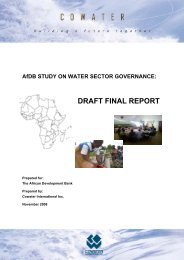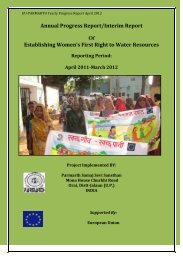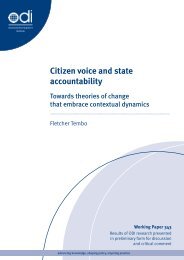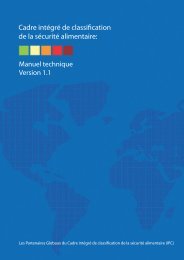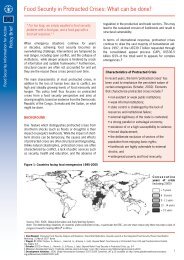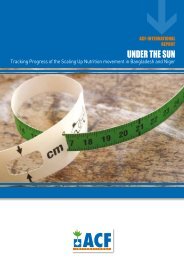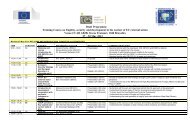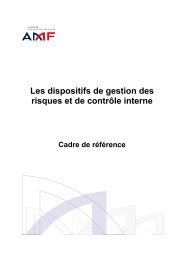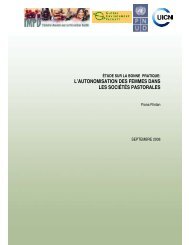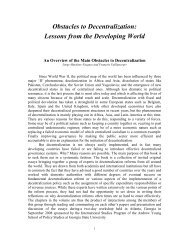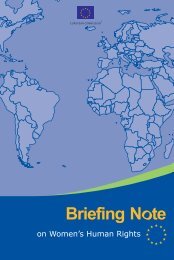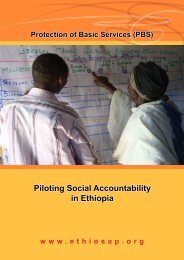Extraction Technologies for Medicinal and Aromatic ... - Capacity4Dev
Extraction Technologies for Medicinal and Aromatic ... - Capacity4Dev
Extraction Technologies for Medicinal and Aromatic ... - Capacity4Dev
Create successful ePaper yourself
Turn your PDF publications into a flip-book with our unique Google optimized e-Paper software.
EXTRACTION TECHNOLOGIES FOR MEDICINAL AND AROMATIC PLANTS<br />
3.7 Infusion<br />
3.7.1 General Considerations<br />
Infusions are dilute solutions containing the readily soluble<br />
constituents of crude drugs. Formerly, fresh infusions, prepared by macerating<br />
the drug <strong>for</strong> a short period in cold or boiling water, were used <strong>and</strong> diluted<br />
to eight volumes but, now, infusions are usually prepared by diluting one<br />
volume of a concentrated infusion to ten volumes with water. Concentrated<br />
infusions are prepared by a modifi ed percolation or maceration process.<br />
After dilution with water, concentrated infusions resemble in potency <strong>and</strong><br />
aroma the corresponding fresh infusion. Infusions are liable to fungal <strong>and</strong><br />
bacterial growth, <strong>and</strong> it is necessary to dispense them within 12 h of their<br />
preparation.<br />
3.7.2 General Method <strong>for</strong> Preparing Fresh Infusions<br />
The coarsely powdered crude drug (50 g) is moistened, in a<br />
suitable vessel with a cover, with 50 ml cold water <strong>and</strong> is allowed to st<strong>and</strong><br />
<strong>for</strong> 15 min. Then, 900 ml boiling water is added, <strong>and</strong> the vessel is covered<br />
tightly <strong>and</strong> allowed to st<strong>and</strong> <strong>for</strong> 30 min. The mixture is strained <strong>and</strong> enough<br />
water is passed to make the infusion measure 1000 ml. Some drugs are<br />
supplied (accurately weighed) in muslin bags <strong>for</strong> preparing specifi c amounts<br />
of infusion <strong>and</strong> as such are used <strong>for</strong> infusion preparation. If the activity of<br />
the infusion is affected by the heat of the boiling water, cold water should be<br />
used. As fresh infusions do not keep well, they should be made extemporaneously<br />
<strong>and</strong> in small quantities at the time of use.<br />
3.7.3 Preparation of Concentrated Infusions<br />
The offi cial monographs also recognize certain “concentrated<br />
infusions” in which 25% alcohol is added during or after the infusion process<br />
<strong>and</strong> then diluted as per pharmacopoeial (offi cial) requirement. Concentrated<br />
infusions are especially prepared in cases in which the active <strong>and</strong> desirable<br />
principles of drug are equally soluble in water <strong>and</strong> in the menstruum used<br />
<strong>for</strong> both concentrates <strong>and</strong> infusions.<br />
3.8 Evaporation<br />
One quality-relevant parameter is the evaporation of the eluate<br />
from the soft extract. The state of art is cautious vacuum evaporation, in<br />
which evaporation temperatures do not exceed 55° C. The temperature in<br />
relation to the evaporation time is of special importance <strong>for</strong> quality of this<br />
step, especially if the extract contains volatile or thermolabile constituents.<br />
81



